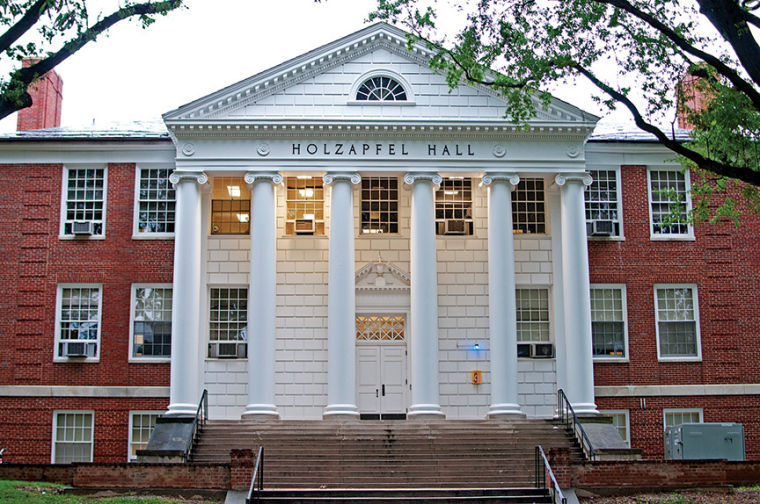
Holzapfel Hall s one of several buildings on the campus that is not up to par in handicapped accessibility. Limited funds prevent the university from being able to improve every building, though housing and facilities are far improved from a few years ago.
As the university prepares to make way for a new teaching and learning center, America Reads*America Counts — a mentoring program that works with local elementary schools — will leave its home in Holzapfel Hall this summer and head to Stamp Student Union.
The Edward St. John Learning and Teaching Center, a $55.1 million center that has been in the works for more than two decades, is still in design stages. But America Reads*America Counts and several other groups must vacate Holzapfel Hall so site design and construction on the new center can begin.
The new building will be constructed between Campus Drive and the historic front of Holzapfel facing McKeldin Mall, said Stamp Director Marsha Guenzler-Stevens. The original building’s facade will remain, but the university will demolish Shriver Hall to make way for the center.
No physical construction is planned for this summer, said Carlo Colella, Facilities Management associate vice president. However, all units in Holzapfel are expected to vacate by the end of the fall semester.
“We need them out of there soon,” Colella said. “It’s more convenient, I think, on everybody if that happens with ample time before we’re there with workers trying to knock things out.”
America Reads*America Counts plans to make the move before the start of the upcoming semester, said Ali Barlow, the program’s coordinator. She said the move to Stamp will enable them to connect with similar organizations.
“It doesn’t really feel like we’re being forced out of our home because we’re joining the rest of Leadership and Community Service Learning, which is kind of our family group,” Barlow said.
But space concerns remain an issue for the group, Barlow said. About 280 students are volunteering through America Reads*America Counts this semester, and possibly more this summer.
“I think some of the hanging-out-in-the-office time that our students do — we’ll have to figure out what works best for us,” Barlow said.
But the space issue is less of a concern than the financial burden the move could put on the university, said Guenzler-Stevens. Holzapfel is a state-supported building, and the program will be moving to a self-supported building, where luxuries such as space, heating and air conditioning are not funded by the state.“That’s probably the primary detractor,” Guenzler-Stevens said. “It’s a financial detractor.”
Still, the program’s coordinators are confident the major move will be beneficial in the long run, especially since a location in Stamp could increase program visibility.
“Students barely know how to find our office right now,” Barlow said. “So moving to the Stamp will give much more of a centralized location.”
The new location could also increase the program’s access to resources and collaboration with other departments, Barlow said.“What will be easier is training space,” she said. “Because right now, we don’t have any space in this building we’re currently in to do training and to do meetings. But since we’ll be in Stamp, we’ll have much more access to training rooms and meeting rooms.”
As a collaborative program between the university and Prince George’s County Public Schools, America Reads*America Counts offers tutoring in math and reading and mentoring opportunities for college and elementary school students. A third part of the program offers workshops conducted in English and in Spanish to help parents learn how to teach their children how to read.
But with the upcoming move, Barlow said the identity of her program could shift.
“There’ll be some growing pains, sort of figuring out what our identity is in the context of Leadership and Community Service Learning, since we have had this sort of pre-established identity that’s associated with our space to some extent,” she said.
But with the potential for an increase in visibility next semester, tasks such as looking for volunteers could become much easier for the program.
“To me, there are an awful lot more pros than cons to this move,” said Barlow.
newsumdbk@gmail.com



